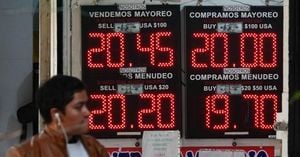The Tokyo Stock Exchange is bracing for another challenging day on January 28, 2025, as the Nikkei average shows signs of continued decline amid pressures from global market trends.
Investors are reacting to the recent downturn of U.S. technology stocks, particularly highlighted by the Nasdaq's notable drop of 3.06% reported on January 27, 2025. This downturn has set the stage for pressures on major semiconductor-related stocks within the Tokyo market. Analysts warn the Nikkei may open over 550 points lower, dragging it to approximately 39,000, following the previous day's closing price of 39,565.
Market analysts, including Mutsumi Kagawa from Marine Strategies, note the drop correlates strongly with events outside Japan, where fears around artificial intelligence innovations and foreign tariffs on technology products have loomed over investor sentiment. Kagawa stated, "Concerns surrounding high-performance semiconductors are leading to significant drops among related stocks." The vulnerability of semiconductor stocks, often seen as foundational to Japan's tech infrastructure, has left many investors worried about their portfolios.
Adding to investor anxiety is the exchange rate, with the yen rising against the dollar. Recent currency movements have caused heightened selling pressure on export-dependent companies, which are integral to Japan's economy. According to reports from Bloomberg, "Investor sentiment has been dampened due to expectations of continued weakness influenced by overseas markets." A falling yen can often buoy export stocks; hence, the current climb is viewed as detrimental.
Experts believe the Nikkei's underperformance might lead to wider market reactions as traders adjust their strategies based on the previous day's U.S. market performance. Trading desks have seen heightened activity as investors hedge against potential losses by liquidifying stock holdings perceived as overvalued.
The backdrop is particularly concerning for semiconductor companies hit hard by drops exceeding 9% on the Philadelphia Semiconductor Index following supply and demand forecasts. Stocks like Advantest and Tokyo Electron are noting significant declines as uncertainty surrounding high-performance semiconductor demand builds.
Further complicate matters is the recent announcement from the U.S. government concerning potential tariffs on foreign-produced chips and materials. The potential increase of tariffs on semiconductors and other products has cast shadows on investor projections. Observers remain concerned this might escalate tensions between the U.S. and China, thereby impeding growth and innovation across the tech sector globally.
Kagawa highlighted, "The AI development race could escalate tensions between the U.S. and China, making it challenging for Japanese stocks to regain footing amid this environment."
Meanwhile, the Nikkei 225, often monitored as a key indicator of Japan's economic health, reflects broader trends experienced globally. After reaching up to 40,398 last December, the index has undergone significant fluctuations, creating unrest among investors who had anticipated stability following earlier rebounds. The situation echoes the volatility of 2023 when unprecedented adjustments within tech stocks prompted similar market responses.
Trading volatility continues to plague sectors from automotive to electronics due to the interplay of foreign economic indicators. Specifically, top-tier automotive makers like Toyota and Honda are now facing diminished forecasts as currency value fluctuations thwart profit margins. The overarching sentiment harbors disquiet as the market continues to grapple with conditions believed to adversely affect Japan's economic projections.
Though some segments of the market are witnessing resilience, such as Fast Retailing and KDDI, the general outlook remains bearish amid circumstances prompting headwinds for most industries. Despite some stability found within specific stocks, broader indices suggest trouble lies ahead.
Experts advise investors to remain vigilant and responsive to last-minute developments coming from both domestic and international fronts. The overall strategy moving forward may hinge significantly on how trading patterns evolve over the next few weeks. Attention will likely remain fixed on responses from U.S. stocks as the Nikkei average translates those fluctuations back home.
Throughout today’s trading session, investors on the Tokyo Stock Exchange will contend with volatile dynamics driven by shifts beyond their immediate control. The persistent undercurrents of technological advancements, currency fluctuations, and policymaking continue to shape the complex narrative of market performance.
Today's trading hours may discern whether the Nikkei's decline persists or if there are flashes of optimism through key indicators yet to emerge. Given these trends, investors must stay alert to market signals indicating potential rebounds or continued falls.



